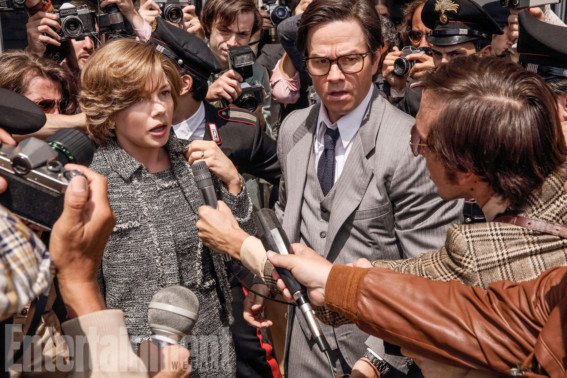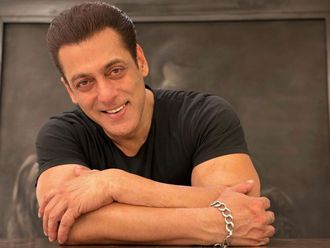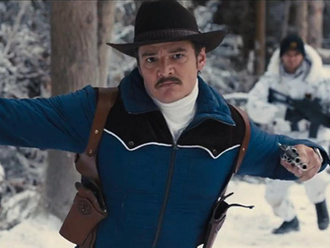
Ridley Scott makes a long, pained sound when I ask how he received the news four months ago that Kevin Spacey had become radioactive just as their film, All the Money in the World, was gearing up for release. “Eeeeeeeh,” the director sighs at the memory. “You get that nasty, deep, gut feeling: oh [expletive].”
It was late October when allegations of sexual misconduct started flying around, sending the Oscar-winning actor into disgrace and planting a big question mark over Scott’s $40 million thriller about the 1973 kidnapping of John Paul Getty III. Spacey, wearing facial prosthetic makeup, played Grandpa Getty, the octogenarian tycoon who refused to pay a ransom for his grandson.
The film was in the can and trailers were in cinemas. Sony Pictures was touting Spacey’s performance as Oscar-worthy, an opinion Scott seems to share: “When I finished it with Kevin, it was kind of perfect.” The director had enjoyed working with the House of Cards star. “I got on very well with him. He’s a very good actor, great fun to work with.” You might think, then, that Spacey’s sudden toxicity created a dilemma for Scott, some anguish before he decided to expunge Spacey from the film and reshoot it with Christopher Plummer in the role. You would be wrong. The director who brought us Alien, Blade Runner, Thelma & Louise and Gladiator doesn’t do anguish.
“My decision was almost immediate. I said: ‘We need to re-do this.’ I phoned Christopher and asked if he’d meet me in New York. Met him that night.” An unprecedented Hollywood gamble to reassemble cast and crew for breakneck shooting and editing in a race to deliver a new version in time for the US Christmas box office, just like that? Scott nods. “I didn’t agonise. I never dwell on a problem, only the solution. You learn to do that, doing what I do.”
In the UK, the Guardian’s Peter Bradshaw has called it a “raucous pedal-to-the-metal thriller”. Spacey’s erasure has emboldened the BBC to do its own vanishing trick: scrubbing Ed Westwick from the Agatha Christie drama Ordeal by Innocence in the wake of sexual assault accusations against the actor, which he denies. He will be replaced by Christian Cooke.
One word recurs when talking to Scott: business. Sir Ridley, knighted in 2003, is an artist — in addition to making films, the Royal College of Art alumnus paints. But questions about ethics, acting and storytelling are redirected to the realm of budgets, profit and loss and bums on seats. “When you’re in film, it’s a lot of money to lose if it’s not working. Business is always highly linked with the creative process.”
The 80-year-old learned hard lessons half a century ago running his own advertising firm in London, and directing TV ads for Hovis and Chanel No 5. “You do a budget. If you’re wrong, you pay. If you go into overtime, that’s your fault. Every time you waste time, you’re losing money.”
It’s a balmy January afternoon, Californian sunshine streaming in the window, and Scott is perched in a Beverly Hills hotel suite, his black T-shirt and boots and sleek silver hair rather LA, but his accent more Durham than Malibu. His ability to write, produce and/or direct several films a year — a workrate he acknowledges is crazy — hinges on investors and studios having faith he will make them money. “It’s in the DNA. My mum wasn’t a businesswoman but should have been. A frustrated business person, all 5-ft of her.”
He’s not keen on holidays. “What the [expletive] Thanksgiving? It’s a [expletive] turkey. I never think about things like that. The fact that the world stops for three weeks over Christmas is insane. You lose nearly a month.”
Erasing Spacey from a completed film was a bold move in a career packed with them: casting the unknown Sigourney Weaver as the lead in Alien; channelling Orwell in his 1984 Superbowl commercial for Apple; sending his two heroines over a cliff in Thelma & Louise. The switch raised intriguing questions. Should a performance be extinguished because of the performer’s alleged off-screen misconduct? Should the performer be presumed innocent until proven otherwise? (Spacey apologised to Anthony Rapp, who said he was 14 when the actor made unwanted sexual advances, but stayed silent about other accusations.)
I tell Scott the decision reminded me of Stalin airbrushing purged comrades from group photos. He doesn’t take offence, but it is not clear he agrees with the comparison because he goes on to say it was, of course, just business. “Whatever you do in private is not my business. It only becomes my business if it infects the business that I’m in. Then it’s my duty to do something about it.” In cold print that may sound like Michael Corleone, but Scott’s breezy cheer is closer to Del Boy.
Spacey’s disgrace — part of a torrent of allegations against prominent figures uncorked by those surrounding Harvey Weinstein — triggered boycott calls against All the Money in the World. Scott sensed an existential threat to his film. Negative test screenings and nervous cinema-chain owners would make the film’s backers balk at spending an estimated $25 million to $35 million in so-called print and advertising — on top of the $40 million production cost — to distribute the film.
“The P&A is going to untangle and at some point somebody will say let’s not put the film out. It would infect the movie to the extent that we’d eventually decide not to sell it ... and not spend good money after bad. It’s aways a business decision.”
Scott calculated the cost of reshooting and editing at $10 million. He told Dan Friedkin, a billionare auto tycoon and key investor, that they could pull it off. “I told him we can fix this, I’m almost certain we can get the next Getty.” Speed was crucial to catch the Christmas box office — and to get ahead of a TV version of the story directed by Danny Boyle.
On November 7, Scott met Plummer in the Terrace Boardroom of the Four Seasons Hotel in Manhattan and asked him to step in for a whirlwind nine days of shooting. The veteran actor — Captain von Trapp in the Sound of Music — had been previously considered for the Getty role. “We only went with Kevin because Kevin was younger, the part was challenging and Christopher was 87. I erred on the side of youth, which I shouldn’t have.”
Plummer accepted and Scott scrambled into action. Michelle Williams, who played the kidnapped teen’s mother, and Mark Wahlberg, who played a Getty family fixer, agreed to reshoot scenes for no extra payment, he says. He reassembled key crew members and arranged permission to reuse locations in England and Italy. “For me it was just organisation, bang bang bang bang bang. If I was going to feel anxious about anything it would have been about my new Mr Getty because it’s a lot of words, 22 scenes. He had to get it down.”
His new star nailed it. “Plummer’s got this enormous charm whether he’s doing King Lear or The Sound of Music. This guy’s a real colouring book, he can do anything.” Plummer’s twinkle gave the miserly tycoon more warmth than Spacey’s portrayal, but both actors captured the character’s isolation, he says. “You get so wealthy that there aren’t that many friends you can have. People are never normal with you. You become lonelier.”
Scott’s habit of using multiple cameras and doing few takes kept the schedule on track. “I’d say: ‘Action.’ Bang, away we go. Because I’m [simultaneously] doing close-up and wide-shot, I’m capturing everything. The most important thing of all is the actor. To do less takes is better, because an actor wears out. It’s a bit like being a standup comedian. You tell a joke once, it’s funny ... the third time, it’s starting to wear a bit thin.”
While shooting he worked closely with editor Claire Simpson — “like a two-headed computer” — to shape the material. “You just become more practised and cut away the [expletive].” He does screenplays at the same chop-chop pace. “Start in the morning, get on another pot of coffee, write the [expletive].”
Audiences may shield their eyes during a graphic scene where the kidnappers, tough gangsters in southern Italy, slice off part of young Getty’s ear, a mutilation that finally compelled the elder Getty to stump up part of the ransom (making sure it was tax-deductible). “The film was nearly journalistic so I figured we may need a wake-up call in the middle. Rather than hear about it, why not show it, the whole bloody thing.”
Against stiff competition the film has done decent, unspectacular business at the US box office and generated award buzz: Golden Globe acting nominations for Plummer and Williams, and a directing nomination for Scott.
Whether Oscar glory beckons or not, Spacey’s ghost will always hover over the film, his absence a singular testament to Hollywood’s backlash against alleged sexual misconduct. Scott says he was unaware of casting couch abuses after moving to Hollywood in the late 1970s. “I thought it was maybe something from the 1930s, 40s and 50s.” He has not witnessed abuses. “I’m not a party-goer. I work so hard during the day that when I get out of there, that’s enough. I’ve taken one snort [of cocaine] in my life and I thought I was getting root-canal. It was absolutely disgusting. And I’ve had one joint. I hated that loss of control, I didn’t like it at all.”
Spacey’s sexual orientation did not completely escape the director. “I knew he liked the chaps, you know. But it’s not my business. I never witnessed anything untoward. He’s a very good actor. It’s a pity.” A pity Spacey allegedly preyed on young men, or a pity his talent may no longer have an outlet? Scott doesn’t elaborate.
He seems unsure if the outing of alleged wrongdoers has gone too far or not far enough. As a viewer he sees no need to shun films by Spacey or directors such as Roman Polanksi, who was convicted of rape. “I can separate the creative talent from whoever the man is.” He cites Arthur Miller’s play The Crucible, about witch-hunts. “I just hope a lot of this isn’t going OTT. I know that’s a very unpopular thing to say, but there it is.” He pauses and cracks a grin. “It’s certainly going to affect dating.”
Scott, a father of three, turns serious when mulling the impact of abuse on children and the young. What Polanksi did to his 13-year-old victim, he says, was shocking and unacceptable. Morality aside, abuse is bad for the bottom line. “In business, you cannot have that.”
Hollywood’s reckoning has further to go, he says. “There aren’t enough people being pursued. It sounds a lot, but it’s not really. It’s long overdue, honestly.” He thinks actors who are trailed by misconduct rumours will struggle for work. “The first people to pick that up would be the studio because it’s their money. They’d say: ‘Oi, we don’t want any problems’.” Scott is “amazed” that several upcoming films, which he declines to identify, have not been kiboshed.
The director has on occasion hired actors with personal problems, such as the late Oliver Reed in Gladiator. “He was an alcoholic. I said: ‘Oliver, don’t let me down.’ He said: ‘Whatever I do after five o’clock is my own business, so go [expletive] yourself.’ I said: ‘Fine, but if you do it before five o’clock, I’ll [expletive] you royally.’ That was the conversation.”
–Guardian News & Media Ltd
All the Money in the World is playing in UAE cinemas now.














